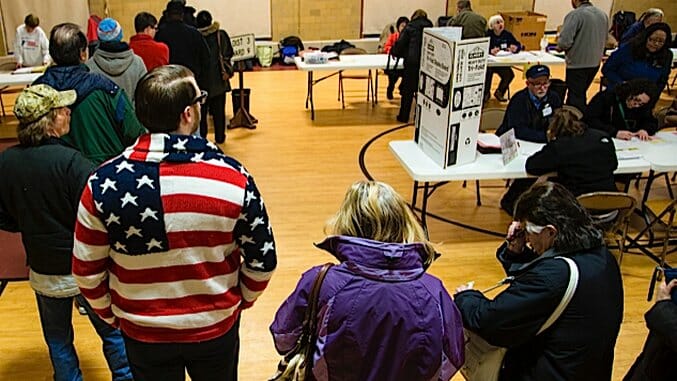The U.S. Should Institute Compulsory Voting, Aussie Style, to Weed Out the Crazies
Photo by Darren Hauck/Getty Politics Features
Here in Australia, we have compulsory voting, and citizens can be fined if we don’t turn up to the polls on Election Day. I should mention now that this is not a cure-all for electoral participation. For instance, it doesn’t prevent what we call “donkey votes”, where people just leave the ballot paper blank or vote for their favourite Star Wars character. It also doesn’t prevent simply never registering to vote in the first place. Finally, a good excuse like “I was on a beach in Bali, and so couldn’t possibly vote” is also seen as a valid way to avoid the $20 fine, but you get the general idea. With a few exceptions, come Election Day, Australians vote.
As only 22 countries in the world have mandatory voting, this puts Australia in a distinct minority.
While every few years an opinion piece is written suggesting that this practice is in fact anti-democratic and should be scrapped, I quite like it. It means there’s no pressure to get out the vote, and therefore no pressure to pronounce controversial policies politicians know will never become reality, in a desperate attempt to whip up their base.
Sure, this could be considered a freedom of speech issue, that you shouldn’t be forced to give your opinion in a free and democratic society. Voting could also be considered a right, rather than an obligation. But in today’s Australia, and indeed in much of the Western world, political apathy reigns. If left to our own devices, we’d all much rather be snuggled up on the couch binging on Game of Thrones than queued up at the local voting centre. The free sausage sizzle put on by the local Rotary club to compensate us for the strain of voting would face tough competition if pitted against the adventures of Jon Snow.
We come very much from a “she’ll be right” culture, and we tend to think all politicians are “dickheads” best given a wide berth; so compulsory voting is good for us. On the whole, it makes us take notice of policy, and form reasonably intelligent opinions about where the country is headed (general consensus? Nowhere good, but that’s a different story). We know we have to choose someone on Election Day, and so we feel a responsibility to be able to adequately justify our choices. We have considered opinions on health care, education and migration. We’d seriously prefer to talk about the rugby instead, but if you corner us we can give you concise bullet points outlining the pros and cons of the positions of the two major parties on core issues.
To belatedly give some background, our two main political parties are the Liberal-National Coalition (roughly similar to the US Republican party…ish), currently in power, and the Labor Party (who would love to be compared to Democrats). The Greens are a smaller party with around 8% of the vote, very socially and environmentally progressive, and hold the balance of power in some policy areas.
Sometimes, especially when voters’ distaste for the politicians of the day overwhelms them, compulsory voting really backfires. We get protest votes. Currently, we have people from teeny tiny minor parties (including an ex-footballer, a businessman obsessed with rebuilding the Titanic, and someone from something called the Australian Motoring Enthusiast Party) wielding what some consider way too much political power. Electoral reforms might put paid to that shortly, but historically, protest votes haven’t been terribly significant. When they do occur, they shake up the main parties and reinvigorate the population’s interest in the pollies (NB: Australian slang for politicians). We find the mainstream views challenged, we debate interesting ideas, and the people the protest votes brought in usually fade away come the next time to vote.
In the US, voting is obviously voluntary (except in Georgia, which made voting compulsory in its 1777 constitution – fun fact!), but less than 60% of you vote in presidential elections. How is it possible, given the passion, the vitriol, the mocking of candidates on late night TV, that just over half of you vote? What happens to the rest?
Every four years when the presidential election rolls around, we hear American candidates calling to Get Out the Vote. We have Cameron Diaz and others calling on Latinas to vote, Rock the Vote, getting youth to vote, African Americans to vote – vote for your community’s issues! And this is very important, of course. But it also means that candidates have to capture the public’s attention. We see time and time again wild claims being made during the primaries (ahem – a wall funded by Mexico anyone?!), just to get numbers up, to get those votes rolling in. It’s all about personalities, and simple, overblown issues. The more contentious the better: immigration, Islam, national security, religion, gay marriage/religious freedom, abortion… the list goes on. They are hot button issues meant to get crowds whipped into an Us versus Them frenzy, so they’ll turn out to the polls to make sure their voices count.
Candidates generally tack back to a (more) centrist position come the general election, ignoring some of their more inflammatory statements as if they were never spoken. They have to, to appeal to moderate voters, independents, and anyone they can poach from the opposing side. But could the entire conversation be less inflammatory, more inclusive, and more based on real policy options or vision, if people were obliged to go to the polls on Election Day?